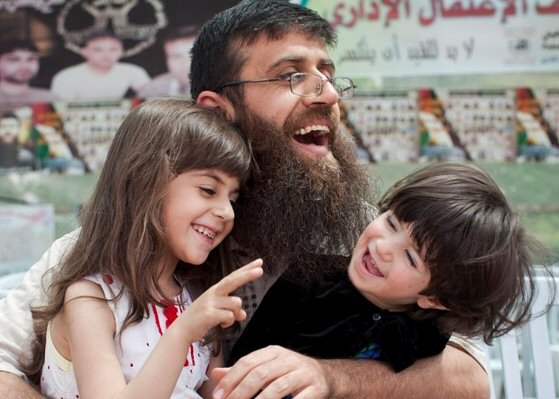Former Palestinian hunger striker and detainee, Khader Adnan, has been on a hunger strike for seven consecutive days in protest of his administrative detention in Israeli jails, without charge or trial, according to Adnan’s family.Shortly after he announced a hunger strike, Adnan was transferred to a solitary cell by the Israeli prison administration as a punitive measure, his family told WAFA Palestinian News & Info Agency.
Adnan is a senior Islamic Jihad official and a former prisoner and hunger striker. He was re-arrested by the Israeli authorities in July 8, 2014, two years after he was released from Israeli prisons following a 66-day hunger strike against administrative detention, where no formal charges were laid against him.
Adnan is said to be a pioneer of the lone-wolf hunger strike movement in Israeli jails, where prisoners protest their administrative detention by launching an individual, rather than mass hunger strikes.
Though he has been detained several times since 1999 on the basis of alleged activities related to Islamic Jihad, Israel has never charged him with involvement in attacks on Israelis.
Under administrative detention, Israel detains Palestinians without a direct charge and holds them in jail for indefinite, renewable periods.
Palestinian detainees have continuously resorted to open-ended hunger strikes as a way to protest their illegal administrative detention and to demand an end to this policy which violates international law.
In the meantime, the health condition of the three Palestinian prisoners detained in the Israeli Naqab prison have recently deteriorated due to deliberate medical negligence by Israel, the Palestinian Prisoner’s Society (PPS) reported on Tuesday.
Prisoner Ahmad Salmi Salameh, 31, from Qalqilia, who was arrested in 2003 and sentenced to 24 years in jail, suffers from an injury in his arm as a result of an Israeli bullet wound during his arrest; his arm is nearly 70% paralyzed due to being denied the necessary medical treatment. Salameh filed a petition at an Israeli court to demand providing him with treatment, however, his petition was rejected by the court.
As for prisoner Mansour Shahatit from Hebron who was arrested in 2004 and sentenced to 17 years in jail, PPC reported that he suffers from neurological problems, a tumor in his neck, in addition to heart, breathing and joint problems. The prison clinic prescribed a medicine for Shahatit, however, the prison administration refused to provide him with it.
Meanwhile, Mohammad Nasri Abur-rub from Jenin, who was sentenced to 24 years in jail in 2003, has been suffering from serious intestinal infections which have severally worsened, causing him internal bleeding for years, due to medical negligence.
More than 6,500 Palestinian political prisoners are currently held captive in Israeli jails. There are around 1500 sick prisoners distributed across Israeli jails, most of whom suffer from chronic diseases.
Medical negligence has widely been reported as a systematic policy by the Israeli Prison Authority.
Palestinian prisoners are held in overcrowded cells that lack basic health standards, including the infestation of insects and rats, extreme cold and lack of heating methods, and wastewater leakage into their cells, which further aggravates their already poor conditions.
According to Addameer human rights association, “Israeli authorities responsible for prisoners regularly neglect their duties to provide medical support for Palestinian prisoners in their care, as required by the Geneva Conventions.”
“Medical problems are widespread, and range in severity from chest infections and diarrhea to heart problems and kidney failure. Treatment is often inadequate and is delivered after substantial delays. Often medication is limited to over-the-counter pain killers.”
See also: Lawyer Shireen al-‘Eesawy Moved Into Solitary Confinement
Prison Sentences Reinstated to 5 Ex-Detainees

